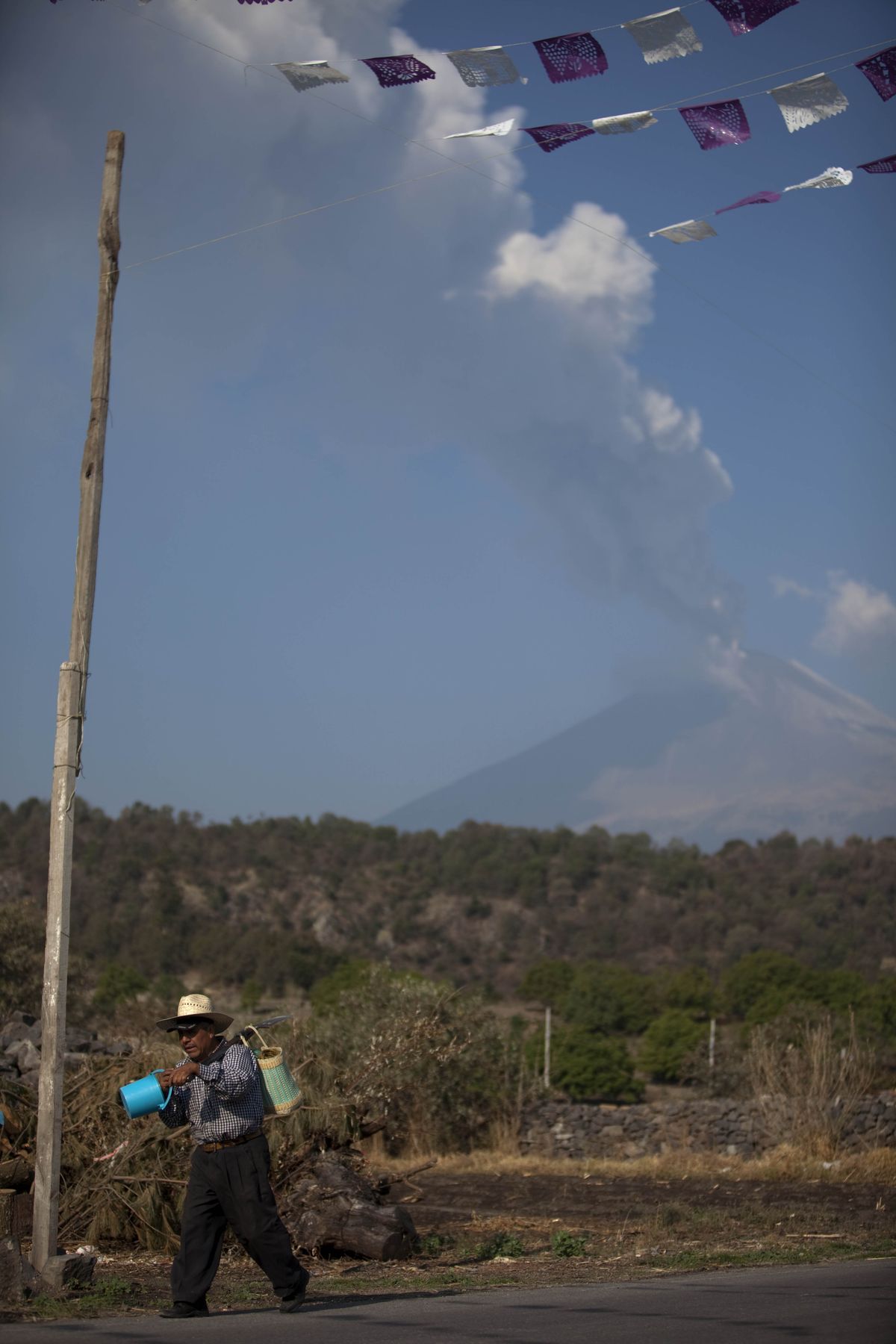Volcano spews ash near Mexico City

XALITZINTLA, Mexico — A 17,886-foot volcano outside Mexico City exhaled dozens of towering plumes of ash and shot fragments of glowing rock a half-mile down its slopes this morning, frightening the residents of surrounding villages with hours of low-pitched roaring not heard in a decade.
A roiling white cloud of ash, gas, water vapor and superheated rock spewed from the cone of Popocatepetl high above the village of Xalitzintla, whose residents said they were awakened by a window-rattling series of eruptions. Mexico’s National Disaster Prevention Center said that a string of eruptions had ended in the early morning, then started up again at 5:05 a.m., with at least 12 in two hours.
“Up on the mountain, it feels incredible,” said Aaron Sanchez Ocelotl, 45, who was in his turf grass fields when the eruptions happened. “It sounds like the roaring of the sea.”
The white cone of Popo, as most call the mountain, is an iconic backdrop to Mexico City’s skyline on clear days, but its 40 miles distance means even a moderately large eruption is unlikely to do more than dump ash on one of the world’s largest metropolitan areas. It’s a different matter for the villages on the flanks of the volcano, where the quiet of the corn fields and fruit orchards was pervaded by the volcano’s spooky roaring.
“Everyone needs to take this seriously. This buzzing, this roaring isn’t normal,” said Gregorio Fuentes Casquera, the assistant mayor of Xalitzintla, a village of 2,600 people about seven miles from the summit. He said the town had prepared 50 buses and was sending out its six-member police forces to alert people to be ready to evacuate.
He said he believed about half the populace would be willing to evacuate, while the rest would want to stay.
Leon Analco Analco, 83, chopped corn stalks with a machete as he related some residents’ plans to simply move to a shelter they’d constructed on a ridgeline about 200 feet higher than the rest of the village.
“This is a ravine. All the mud will run down here. It’s dangerous,” he said.
Webcam images on the site of the National Disaster Prevention Center showed the plume rising from the top of the peak at dawn, though clouds obscured the volcano for people further away. The Televisa television network broadcast images of red, glowing material rising from the crater and falling on its slopes.
Authorities this week raised the alert level due to increasing activity at the volcano, whose most violent eruption in 1,200 years occurred on Dec. 18, 2000.
The coordinator general for civil protection, Laura Gurza, told Televisa that officials were not yet ready to order any evacuations, but urged people living near the mountain to be “very, very attentive” to action at the volcano. She also urged them to gather important papers and to have their escape routes planned in case they have to leave.
The ash was blowing to the northeast, in the general direction of the city of Puebla.
Residents of Huejotzingo, 18 miles from the peak, went about the day as normal despite a magnificent plume of ash and water vapor. Luz Maria de Olate, 35, put her 5-year-old in a surgical mask because the teachers said the ash could damage children’s lungs.
But like hundreds of other residents on the flank of the volcano, she doesn’t fear an eruption. Neither did her son as they headed for school.
“I’m not afraid. He’s my uncle,” said Oscar Olate, expressing the personal relationship many in the Mexico Valley feel toward Popocatepetl, whose name means “smoking mountain” in the indigenous Nahuatl language of the Aztecs.
People view it with fondness, said street vender David Gorzo Navarro, 45.
“When the ash falls, it’s like fertilizer,” he said.
More than 30 million people live within view of the volcano, which sits at a point where the states of Mexico, Puebla, and Morelos come together. It has been erupting intermittently since December 1994.
President Felipe Calderon said Mexicans are living in complicated times, given the 2009 swine flu outbreak and floods and drought this year.
“All we’re missing is an eruption of Popocatepetl and we’ll complete the picture,” he said in a speech late Thursday. “Hopefully not,” he added, knocking on wood.